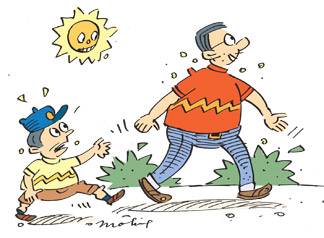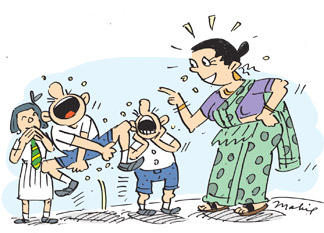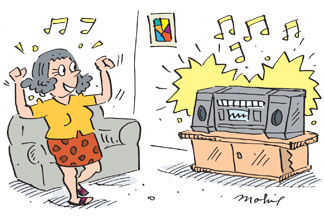|

by R. S. Karunaratne
Adverbs of comparison
We use adverbs of comparison when we compare the actions of two
people or things or actions of one person or thing at two different
times.
|

Father walks faster than me. |
Maureen works harder than Menaka.
Father walks faster than me.
Fernando drives more carefully than Harris.
Grandma sleeps more than she used to do.
Hema came closer to winning the prize than she did last year.
We use superlative adverbs when we compare the actions of three or
more people or things or the actions of one person or thing at three or
more different times.
Saman works the hardest of all the employees in his office.
We had the highest rainfall last year.
This house is the most attractively built in the housing complex.
Namasivayam laughed the loudest of those who listened to the teacher’s
jokes.
Cathy played the best among the participants in the table tennis
tournament.
We do not use adverbs ending in ‘er’ or ‘est’ with ‘more’ or ‘most’
in the same sentence.
Don’t say: My journey to Marawila took more longer today than
yesterday.
Say: My journey to Marawila took longer today than yesterday.
Some adverbs have irregular comparative and superlative forms.
Adverbs: badly, little, much, well
Comparative forms: worse, less, more, better
Superlative forms: worst, least, most, best
|

Namasivayam laughed the loudest
of those who listened to the teacher’s jokes. |
Most one syllable adverbs take ‘er’ in the comparative form and ‘est’
in the superlative form.
High, higher, highest
Hard, harder, hardest
Fast, faster, fastest
Loud, louder, loudest
Long, longer, longest
Adverbs ending in ‘ly’ take ‘more’ in the comparative form and ‘most’
in the superlative form.
Quietly, more quietly, most quietly
Soundly, more soundly, most soundly
Sweetly, more sweetly, most sweetly
Softly, more softly, most softly
Keenly, more keenly, most keenly
[Activity ]
Rewrite the following sentences correctly. Check your answers with
the key.
1. Sylvia worked the most hardest of all the students;
…….........................................
2. Tamara visits her parents frequently these days than she did
before. ……................
3. The elephants at the Zoological Gardens performed more better than
the lions. ......
4. Our cricket team played bad than the other team.
…..................................................
5. The present principal handles children strictly than the former.
……........................
Key:
1. Sylvia worked the hardest of all the students.
2. Tamara visits her parents more frequently these days than she did
before.
3. The elephants at the Zoological Gardens performed better than the
lions.
4. Our cricket team played worse than the other team.
5. The present principal handles children more strictly than the former.
[Current English usage ]
This column aims to provide an easy work of reference for those who
wish to write good English. Many changes occur in English as it is a
living language.
1. Anarchy / Anarchism:
Both words look similar but they have different meanings. ‘Anarchy’
is a state of political disorder. ‘Anarchism’ is a political philosophy
that aims to reduce laws to a minimum and allow the people to enjoy the
maximum of liberty.
2. Anticipate / Expect:
‘Anticipate’ means ‘foresee and take action against.’ The LTTE had
anticipated the army’s next move. We expect the Indian singer’s arrival
tomorrow.
3. Approve / Approve of:
‘Approve’ means ‘give consent to.’ It is usually used in the passive.
Your leave has been approved. ‘Approve of’ means ‘think well of.’ Father
did not approve of my plans to go abroad for higher studies.
4. Arab / Arabian / Arabic:
‘Arab’ refers to a race. Arab warriors invaded the island. ‘Arabian’
refers to Arabia. She loves Arabian perfumes. ‘Arabic’ refers to the
language. Are you familiar with Arabic characters and numerals?
5. Around / About:
‘Around’ is an Americanism. Shall we meet around 5 o’clock? Use
‘about’ instead because it is British English.
6. Artist / Artiste:
An ‘artist’ is somebody who paints, draws or makes sculptures.
Jayasiri Semage is one of my favourite artists. An ‘artiste’ is a
skilled performer, especially a dancer, singer or actor. Henry Jayasena
was a well-known local artiste.
7. As follows:
‘As follows’ remains unchanged whether it is accompanied by a
singular or a plural noun. The main points are as follows.
8. As from / From:
‘As from’ is used only retrospectively. The new scale of salaries
will be paid as from January 1, 2012. In all other places use ‘from’.
From April 1, 2012 I will be working in a new company.
9. As if:
‘As if’ is used to describe how a situation seems to be. They looked
at me as if I was a foreigner. However, note the difference in the
following sentences. Sam behaves as if he were a millionaire. (But he is
not a millionaire) John walks as if he is drunk. (He is drunk from the
way he walks).
10. As well as:
‘As well as’ does not coordinate two nouns. It usually introduces a
parenthesis. The inspector, as well as the constables, was rewarded.
11. Asian / Asiatic:
‘Asiatic’ has been replaced by ‘Asian.’ So, we speak of ‘South - East
Asia, Asians and Asia.’
12. Assure / Insure:
There is a technical difference between the two words. We assure
against something that is bound to happen, for instance death. On the
other hand, we insure against something that may or may not happen. Eg.
accident, fire, burglary etc. In ordinary English we use the word
‘insure’ irrespective of what insurance companies call it.
Starters:
Use of verbs with 'to' and '-ing'
 We
often use verbs followed by 'to' and another verb. We
often use verbs followed by 'to' and another verb.
I want to see a film tomorrow.
You need to revise all the lessons.
She plans to go abroad for higher studies.
Hema has decided to save Rs. 50,000.
We hope to cross the river in an hour.
We can also form questions in the same way.
Do you want to leave for Canada?
Are you refusing to give me an application form?
Do you expect to meet Krishna tonight?
Are you trying to sell your house?
What do you plan to do now?
Without using 'to' we can use '-ing' verbs.
I enjoy listening to music.
I do not like driving.
She hates getting up early in the morning.
Premila loves eating ice-cream.
Sarath has stopped dancing.
When we use 'would' with a verb, it is followed by 'to'.
I would like to be a doctor.
Sara would love to meet you.
Would you like to have a drink?
I wouldn't like to be an engine driver.
I would prefer to go by train.
[Activity]
Fill in the blanks with 'to...' or '-ing...' forms. Check your
answers with the key.
1. I enjoy ................. (learn).
2. What do you want ....................? (buy)
3. Have you decided ......................... abroad? (go)
4. Nethmi learnt ................... when she was eight. (swim)
5. Please stop .................! (talk).
6. I am trying ................. my lessons. (revise)
7. Have you finished ............... the essay? (write)
8. Now I want ................ to bed. (go)
9.Sriyani suggested ................... for a show. (go)
10. I don't mind ................. by bus. (travel)
Key :
1. learning 2. to buy 3. to go 4. swimming 5. talking 6. to revise 7.
writing 8. to go 9. going 10. travelling
Match the synonyms
Synonyms are words having similar meanings. Match the words in Column
'A' with those in Column 'B'. Check your answers with the key.
[Column A ]
1. Backer
2. Backfire
3. Backing
4. Backlash
5. Backward
6. Bacteria
7. Badge
8. Baffle
9. Bag
10. Baggage
11. Baggy
12. Bait
13. Baked
14. Bald
15. Ballot
16. Ban
17. Bandage
18. Bandit
19. Bang
20. Banish
[Column B ]
A. reaction
B. exclude
C. explosion
D. dry
E. dressing
F. fail
G. prohibit
H. hairless
I. supporter
J. support
K. lure
L. luggage
M. micro-organisms
N. mark
O. loose
P. puzzle
Q. sack
R. robber
S. slow
T. vote
Building blocks
A block of letters that regularly appears at the start of words is
called a 'prefix' . In the following exercise we give one word with the
relevant prefix. Supply two more words for each prefix and check your
answers with the key.
1. AB means 'away from'
Abnormal, Ab ................., Ab ..................
2. AD means 'towards'
Address, Ad .................... Ad ..................
3. AL means 'all'
Altogether, Al .................. Al ...................
4. ANTE means 'before'
Antenatal, Ante ............... Ante ................
5. ANTI means 'against'
Antiwar, Anti ................... Anti ..................
6. ARCH means 'chief'
Archbishop, Arch .................. Arch ...................
7. AUTO means 'self'
Autograph, Auto .................... Auto .....................
8. BENE means 'good'
Benefit, Bene ........................ Bene ........................
9. BI means 'two' or 'twice'
Bicycle, Bi ........................ Bi .............................
10. CIRCUM means 'around'
Circumlocution, Circum ...................., Circum ..................
11. CO means 'together'
Co-author, Co ..........................Co .....................
12. CON means 'together'
Confer, Con ....................... Con .....................
13. COL means 'together'
Collaborate, Col ..................... Col ......................
14. COM means 'together'
Combat, Com ...................... Com ......................
15. COR means 'together'
Correct, Cor ......................Cor .........................
Key:
1. Abuse, Absence
2. Adjust, Admit
3. Always, Almighty
4. Anteroom, Antecedent
5. Antisocial, antidepressant
6. Arch-enemy, Archangel
7. Autobiography, Automobile
8. Benevolent, Benefactor
9. Bimonthly, Bifocals
10. Circumstance, Circumnavigate
11. Co-pilot, Cooperate
12. Constellation, Converge
13. Collateral, Collide
14. Commit, Compact
15. Correspond, Correlation |

